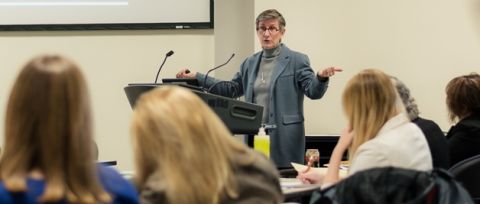
Feminist Legal Studies Queen’s hosted a two-day conference this weekend exploring “(Re)Production: Inequalities of Gender, Racialization, and Class.”
On March 2, Professor Jocelyn Downie of Dalhousie’s Schulich School of Law gave the keynote address. The subject of her talk was a feminist perspective on medical assistance in dying (MAID) in Canada.
“We need medical assistance in dying in Canada that is infused with feminism,” Downie argued. Her lecture explained how feminists and persons with disabilities have been at the forefront of the push to legalize medical assistance in dying since the 1990s. Women have championed reform of the law, pursued Charter challenges, and as health-care professionals they provide medical assistance in dying to their patients.
Downie described a fight that is not yet over. There are renewed challenges to the MAID regime in part because the statutory requirement that death be “reasonably foreseeable” excludes conditions like physical disabilities or purely mental conditions. Women are less likely to be found competent to consent to their own medically-assisted death and are less likely to have advocates for access.
The seven panels that followed over the two days were comprised of Canadian and American academics, students and other experts. They covered such topics as the legalities of gendered expression, labour, and identity; food insecurity and other intersections with human rights; and the impact of taxation policies on equality rights.
Queen’s Law faculty made a strong showing at the panel discussions. Professor Patricia Peppin presented a paper on changes in pharmaceutical law and access to safe and effective treatment. Professor Lisa Kelly gave a paper on state restrictions on child discipline. Debra Haak, a PhD student and instructor, presented on her research topic of the criminal law around prostitution and sex work. Professor Bita Amani’s paper discussed “Toward an Edible Society: Rethinking Innovation and Sustainability in Consuming the (M)other.”
The conference also highlighted the research work of JD students. Danika Winkel, Law’19, analyzed the role of the law in the international commercial surrogacy industry. Rylan
McCloskey, Law’20, explored the resistance of armed forces to integrating women.
FLSQ, co-directed by Professors Amani and Lahey, is an autonomous research group at Queen’s fostering scholarship in feminist legal studies. Each year, FLSQ holds a conference to celebrate International Women’s Day.
By Alexander McPherson